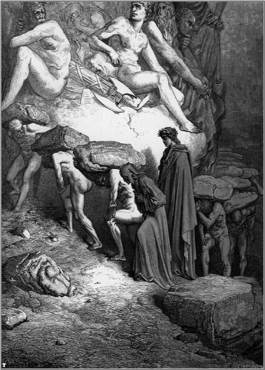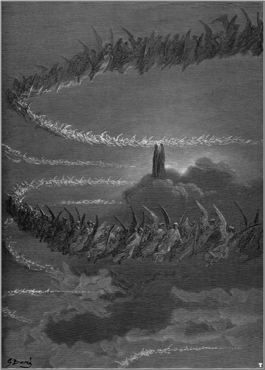Paper 1: creative
I don't normally like "creative" assignments, but I make an exception in the case of Dante, because Inferno in particular has, for the last 700 years, elicited an imaginative response from its readers. In 4-5 pages, I would like you to imagine that Dante (note, Dante, not Virgil) is guiding you through Hell—but the souls you meet there are from the 20th and 21st centuries. Whom do you meet—and why do they merit their particular punishments? What has changed since Dante's visit? The hardest part of this exercise, however, is making it about Dante, and not about you. Yes, it will be funny to imagine a series of vapid celebrities and corrupt politicians suffering for all eternity, but you will be graded on how your choices and explanations show your insight into Dante and the Inferno, not whatever horrible punishment you inflict. For instance, take a look at Ryan Haecker's Inferno—the illustrations and accompanying explanations show that he's attempting to work out the logic of Dante's punishments to the modern world. World War I becomes a "suicide of nations" (and hence nations are punished like Dante's suicides), while lust is represented by a "University of Texas fraternity" and the TSA's body scanners.
4-6 pages. No Hitler.
Paper 2: close reading
Take a short selection (no less than 14 lines, no more than 33) from Purgatorio, and perform an explication de texte. Read this before beginning. Explication de texte has 4 parts:
1. summarize in one paragraph the literal (not the figurative) meaning of the selection.
2. briefly describe the selction's structure
3. analyze the formal, poetic devices used
4. explain how the selection's structure and formal devices contribute to its larger (i.e., figurative) meaning. For this last part, you will need to be familiar with the formal analysis terms found here.
You will be graded on accuracy, insight, and good writing. 4-6 pages.
Paper 3: synthesis
Choose a theme or a topic that runs throughout the Comedy (exile, Florence, love, language, guidance, and so on). How does Dante's journey through the three parts of the afterlife develop the theme? Make use of the precise, formal analysis you practiced in the second paper to analyze three scenes or sequences, one from each cantica, to make an argument about the Comedy as a whole—do not make a lot of vague generalities about poetic greatness or sin and redemption. Use your three specific scenes, along with the background from the secondary readings and presentations, to offera synthetic understanding of the larger work. Each essay should cite at least 3 of the background readings in an appropriate moment (not at random), either to argue with them or to use them in support of your argument.
6-8 pages.
Graduate students: presentation
In 15-20 minutes, with or without PowerPoint or its equivalent, present the assigned readings (the supplemental texts by Dante, Esposito, Zizek, and Auerbach). You may wish to write out your presentation in advance (a typical conference presentation is approximately 8 pages, double spaced, which will usually give you about 15 minutes; 10 pages will give you about 20 minutes), and read that in a communicative and pedagogically effective way. While your audience is chiefly undergraduates, it will normally be graduate students and faculty, so write in a way that is comprehensible but intellectually sophisticate. (And really, why wouldn't you just do that all the time?) Your task is threefold: (1) explain the reading(s) and the arguments made in some detail; (2) explain how they are significant for our understanding of Dante; (3) position yourself with respect to the readings—what are the advantages and shortcomings of an understanding of Dante based on, say, the Vita nuova? Or Esposito? Is Zizek's explanation of courtly love valuable or just de-historicizing?
A word on PowerPoint, since it is a pet peeve of mine. PowerPoint exists in order to provide a visual counterpoint to your spoken presentation. Meditate on that mantra until you understand it. PowerPoint is not there to repeat your presentation, or worse still, to put up large blocks of text that people are supposed to read while you talk about something else. You might as well ask your audience to practice basketball while you talk. Some quick quidelines (these apply equally to Keynote, Prezi, etc.):
• Use only one template for the entire presentation.
• Use a maximum of two fonts (one for headers, one for text).
• A maximum of 3 font sizes may be used.
• Use simple, legible fonts—something assertive for headers, and a plain serif for text.
• Most of your slides should consist of images, and just images.
• Never put a block of text on the screen unless it is a passage to be analyzed.
• If that passage is too long, break it into multiple slides.
• Otherwise, if text doesn't fit, don't make it smaller—make it shorter.
• Every animation and visual "trick" you use will distract your audience from what you are saying.
• Approximately one slide per paragraph (more is okay—don't leave a single slide on screen for too long).
Graduate students: seminar paper
Seminar papers should be 15-25 pages in length, and should demonstrate good writing, and a serious engagement with the primary material and the scholarship on it. When you write a seminar paper, you are practicing to write an article—they rarely get to the stage where they are actually ready to be submitted to a journal, but you are striving to move them in that direction. That means you should have an important issue in the scholarship that you think you have an interesting or worthwhile take on, and you should have read a selection of the scholarship on the specific text or texts you will be writing on. Make it sound like you know a part of the field; read a number (let's say 10) of articles and a couple of books; spend a little time on Google; get an impression of the kind of work that people are doing. In the case of Dante, where the field of schoalrship is so vast, this sort of work will be necessarily sketchy, and your initial conclusions about "the field" that you're investigating may be erroneous. That's okay—that's how you learn.


